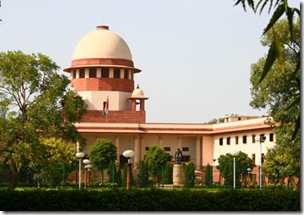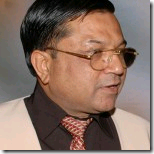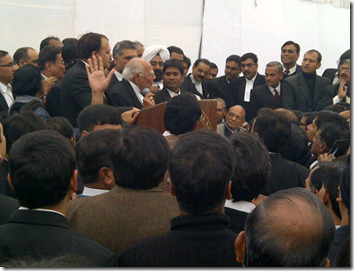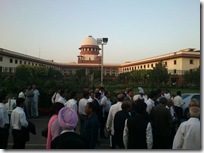Supreme Court
Three high court chief justices - MY Eqbal from Madras, Vikramajit Sen from Karnataka and V Gopalagowda from the Orissa high court - will be elevated to the apex court soon, according to The Hindu.
Citing law ministry sources, the paper reported that the recommendations made on Wednesday’s would be notified within a fortnight.
The Hindu wrote:
Justice Eqbal (61), who hails from Jharkhand, will have a tenure of a little over three and half years; Justice Sen (62), who hails from Delhi, three years and Justice Gowda (61), who hails from Karnataka, a little over four years.
 Breaking: Senior advocates Ram Jethmalani and PK Jain today withdrew their candidature for Supreme Court Bar Association (SCBA) president just before today’s 4:30pm deadline by which nominations for the 2013 elections could be withdrawn. Their withdrawals from the race follow senior advocate Adish Aggarwala yesterday, reducing the race for the SCBA president’s office to one between only three candidates after the incumbent PH Parekh did not run again for the post.
Breaking: Senior advocates Ram Jethmalani and PK Jain today withdrew their candidature for Supreme Court Bar Association (SCBA) president just before today’s 4:30pm deadline by which nominations for the 2013 elections could be withdrawn. Their withdrawals from the race follow senior advocate Adish Aggarwala yesterday, reducing the race for the SCBA president’s office to one between only three candidates after the incumbent PH Parekh did not run again for the post.
 Exclusive: Senior advocate Adish Aggarwala, who was contesting for the office of the Supreme Court Bar Assocation’s (SCBA) president in the SCBA elections next Thursday, withdrew his candidature yesterday. He cited the removal of his name from the SCBA’s voter list, blaming SCBA president PH Parekh.
Exclusive: Senior advocate Adish Aggarwala, who was contesting for the office of the Supreme Court Bar Assocation’s (SCBA) president in the SCBA elections next Thursday, withdrew his candidature yesterday. He cited the removal of his name from the SCBA’s voter list, blaming SCBA president PH Parekh.
 Exclusive: The Supreme Court Bar Association (SCBA) elections for 2013 will be held on 13 December, months behind the conventional schedule of polling in May and with the compact voter list of 1372 bar members, after the Supreme Court (SC) ruled that those voting in other bar association elections cannot vote in the SCBA elections.
Exclusive: The Supreme Court Bar Association (SCBA) elections for 2013 will be held on 13 December, months behind the conventional schedule of polling in May and with the compact voter list of 1372 bar members, after the Supreme Court (SC) ruled that those voting in other bar association elections cannot vote in the SCBA elections.
Former Supreme Court chief justice AH Ahmadi’s son advocate Huzefa Ahmadi, and former additional advocate general of Tamil Nadu Guru Krishnakumar were designated senior advocates by the Supreme Court of India with effect from 21 November.
Following convention, 15 judges from various high courts were also designated seniors.
Out of the high courts, four judges from Allahabad, three from Kerala, two from Patna, and one each from Andhra Pradesh, Punjab & Haryana, Bombay, Madhya Pradesh and Gujarat were designated.
Legally India Supreme Court postcard writer Court Witness said that if retired high court judges applied for the senior counsel designation, usually they would automatically be granted the title. [List of new senior advocates]
A heated exchange between Supreme Court Bar Association (SCBA) president PH Parekh and suspended secretary KC Kaushik at the SC’s Law Day celebrations yesterday caused dignitaries including law minister Ashwini Kumar and chief justice of India Altamas Kabir to temporarily leave the venue.
Kaushik and Parekh were arguing over who will be in charge of the function, after Kaushik insisted he preside over it as SCBA secretary. [PTI]
Legally India had reported on Friday that Kaushik had accused Parekh and SCBA vice president and Additional Solicitor General (ASG) Rakesh Khanna of conspiring against him, and had in October end demanded that they sit for a polygraph test.
Kaushik was suspended from the post of secretary last year after he allegedly advertised his son’s law practice in the SCBA member diaries. He remains suspended pending the final report of the SCBA inquiry against him.
Kaushik who was on the podium announced the arrival of the Chief Justice and asked the SCBA president and vice-president to escort him to the dais. At this point, Parekh rushed to the podium, pushed Kaushik aside and announced that he (Kaushik) had been suspended and was no longer the secretary.
Kaushik then grabbed the microphone from the podium and told Parekh to stick to his job and let him conduct the proceedings. [India Today pictures of altercation]
 Exclusive: Supreme Court Bar Association (SCBA) secretary KC Kaushik, who was censured by the body for allegedly advertising his son’s practice in the SCBA member directories, has accused additional solicitor general and SCBA vice president Rakesh Khanna and SCBA president PH Parekh of using their SCBA executive offices for personal gains.
Exclusive: Supreme Court Bar Association (SCBA) secretary KC Kaushik, who was censured by the body for allegedly advertising his son’s practice in the SCBA member directories, has accused additional solicitor general and SCBA vice president Rakesh Khanna and SCBA president PH Parekh of using their SCBA executive offices for personal gains.
Delhi’s more than 24 tribunals, with 5 more in the pipeline, are demanding official bungalows for their heads “in keeping with their [retired judge] rank”. However, while 32 bungalows for Supreme Court judges and 45 for high court judges are reserved in Lutyens’ Delhi, no such quota exists for tribunal judges.
An official of the urban development ministry informed that tribunal chairpersons are allotted bungalows from the judges’ quota on request received from the secretary general of the Supreme Court or registrar of the high court, and that the ministry is under continuous pressure from the judiciary. [India Today]
Meanwhile, tribunals continue facing growing criticism about their effectiveness and efficiency, yet more keep getting created. [The Firm]
The Karnataka state government has sent a formal request to the Chief Justice of India (CJI) to set up a permanent bench of the Supreme Court in Bangalore.
The Times of India and Business Standard reported that the minister for law and parliamentary affairs, Suresh Kumar, said on Saturday that the state government had asked the CJI to consider the request on priority.
He said: “The then Union Law Minister Veerappa Moily had advocated that this bench should come up in Bangalore. Now, once again, a new memorandum would be submitted to the Chief Justice of India repeating the request.”
The collegium system of judges’ appointments has come under judicial scrutiny again, through a petition for review of the Supreme Court’s nine-judge bench verdict in 1993 in Advocates on Record Association V Union of India.
The petition filed by a Rajasthan-based trust prays for an 11-judge bench to reverse the 1993 decision upholding the primacy of the collegium system.
Chief justice of India Altamas Kabir and justices SS Nijjar and Jasti Chelameswar are hearing the matter, after a bench of justices Deepak Verma and BS Chauhan referred it to the chief justice’s bench last year. Senior advocate AK Ganguli with advocate Bharat Sangal are the amicus curiae. Attorney General Vahanvati and the government have been issued notices.
Ganguli told the court that the procedure adopted in the collegium system "is contrary to constitutional foundations of democracy, separation of powers and checks and balances”. He added that the system “resulted in an anomaly in as much the executive no longer has to share any responsibility in filling up of vacancies in the courts; the entire responsibility being that of the collegium”.
Vahanvati argued that even though the 1993 decision should be reconsidered, the petition filed by a trust was not maintainable under Article 32 of the constitution. [Express]
The collegium system was most recently under the Supreme Court’s consideration in 1998 under a presidential reference. [via @jimanish]
 Exclusive: The Indian Express and Pioneer newspapers will carry front-page apologies for misreporting court proceedings, after yesterday’s hearing in the Supreme Court’s (SC) suo motu contempt petition against the two papers.
Exclusive: The Indian Express and Pioneer newspapers will carry front-page apologies for misreporting court proceedings, after yesterday’s hearing in the Supreme Court’s (SC) suo motu contempt petition against the two papers.
The High Court of Jammu & Kashmir (J&K) will get six new judges, reducing its shortfall of seven judges to one according to Greater Kashmir’s information from “highly placed sources”. The Supreme Court’s collegium has cleared the names of two senior district judges and four lawyers which were pending since a year for the posts.
The names approved include CBI Special Court judge Jammu BL Bhat, registrar general J&K High Court Janak Raj Kotwal, senior additional advocate general Srinagar Ali Muhammad Magray, senior advocate DS Thakur and advocates Azhar-ul-Amin and Tashi Robertson, according to confirmation from a state law department official.
Currently, more than 80,000 cases are pending in the high court. [Greater Kashmir]
The Telecom Disputes Settlement and Appellate Tribunal (TDSAT) got a new chairman in former Supreme Court judge Cyriac Joseph. Joseph who retired from the SC on 27 January after three-and-a-half years on the roster, succeeds former SC judge SB Sinha at the chair after Sinha’s retirement last month.
He is a former chief justice of Uttaranchal high court as well as Karnataka high court.
Joseph enrolled at the bar in 1968, became the senior government pleader in Kerala high court in 1979 until 1987, was Additional Advocate General in Kerala for three years from 1991, and was appointed as a permanent judge of Kerala high court for a month in 1994.
He was transferred to Delhi high court that year, and was appointed as Uttaranchal high court’s chief justice in March 2005. Next year he became chief justice of Karnataka high court. [Indian Television]
Sinha was appointed as chairman in September 2009, succeeding former SC judge Arun Kumar.
Can a high court review its own decision after the Supreme Court has dismissed a special leave petition from such decision? The absence of a definite answer to this question is causing the double-filing of special leave petitions before the SC.
A bench of SC justices Dipak Misra and KS Radhakrishnan has referred the question to a larger bench, in view of the many conflicting positions on it [The Hindu]
A group of lawyers under the name ‘Lawyers for High Court Bench in Western Uttar Pradesh’ met in the Supreme Court arbitration room today and resolved to demand a permanent high court bench at any location in western UP, from the UP state government, the central government and the Allahbad high court.
They also sought support of the Supreme Court Bar Association, Supreme Court Advocates-on-record Association, the Bar Association of India and state bar associations in the matter.
Supreme Court advocate and Nalsar Hyderabad 2006 graduate Ajit Sharma was among the lawyers leading the initiative. Sharma said that “Allahabad High Court is dominated by judges from Allahabad” , and with the “creation of a bench in Western UP “lawyers in Allahabad stand to lose some work”.
The group cited several reasons for establishment of the permanent bench. These included mounting case pendency, decentralising Allahbad high court due to growing judge vacancies, statistics such as judges to population ratio in other states, and huge litigation costs faced by western UP litigants.
Here are a few extracts from the white paper on Western UP’s high court bench:
The struggle of the people of Western Uttar Pradesh for a permanent bench of Allahabad High Court has been going on continuously since early 1950's when Late Chief Minister Dr. Sampurnanda in 1955 recommended creation of a permanent bench in Western UP to the Central Government.
Total number of cases pending in Allahabad High Court as on 30.9.2011 is 9,93,685, over twice as much as in High Court of Tamil Nadu with 4,69,348 cases. 3,56,707 cases are pending in Bombay High Court. Given that Madras High Court has a permanent bench at Madurai and Bombay High Court has permanent benches at Aurangabad and Nagpur, what can possibly justify only one permanent bench in Uttar Pradesh (at Lucknow)?
(source: Court News, published by the Supreme Court, Volume 4, 2011)
Western Uttar Pradesh, which contributes to over 50% of the work load in Allahabad High Court ought to have a bench of its own since it requires around 10 judges worth of work to constitute a bench.
Litigants in Western Uttar Pradesh have to travel over 600 kms to Allahabad and engage new lawyers in order to file appeals. They often take over night trains, stay in hotels in Allahabad and engage new lawyers with whom they may have no relations or may have never worked with. An adjournment becomes prohibitive. These are additional costs imposed on the litigants from Western Uttar Pradesh
SC justices P Sathasivam and Ranjan Gogoi are currently examining whether life-term convicts should undergo simple or rigorous imprisonment.
A man convicted for murdering his wife, whom he suspected of adultery, was sentenced to the life-term by a Maharashtra sessions court and the sentence was reaffirmed by Bombay high court.
In his appeal through the Supreme Court Legal Services Centre, senior counsel Parmanand Katara argued on his behalf that since the Indian Penal Code (IPC) does not define rigorous imprisonment, the lifer should be subjected to only simple imprisonment entailing simple instead of hard labour during his life term.
The Maharashtra government has to file its reply in the matter [BS]
Former senior advocate RK Anand offers free legal service to the families of rioters arrested during the Azad Maidan riots, as reported by several websites and a staff reporter at the Hindu.
The renowned criminal lawyer had, ten days ago, submitted an affidavit to the Supreme Court undertaking to provide only free legal aid and voluntarily take up pro bono matters for a year in order to be cleared of charges under the Contempt of Courts Act. [The Hindu]
Amarchand Mangaldas and senior counsel Gopal Subramanium acted for YSR Congress party president YS Jagan Mohan Reddy to whom the Supreme Court today denied bail in the money-laundering case against him.
Senior advocate Raju Ramachandran and advocate-on-record Gaurav Agrawal who were friends of the court in terrorist Ajmal Kasab’s Supreme Court appeal against the death penalty, donated their fee in the case, totalling Rs 15 lakh, to the Legal Services Authority.
A bench of justices Aftab Alam and CK Prasad asked the Maharashtra government to proportionately distribute the amount among the families of the 18 policemen who were killed in the anti-terror operations following Kasab’s 26/11 terror attack [PTI]
Newly appointed CJI Altamas Kabir has restored the practice of “oral mentioning” of matters in the Supreme Court, and applications for early hearing of matters, which his predecessor Kapadia had abolished when he had assumed office in May 2010 [The Hindu]